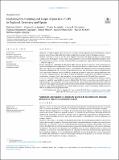Files in this item
Exploring the training and scope of practice of GPs in England, Germany and Spain
Item metadata
| dc.contributor.author | Glonti, Ketevan | |
| dc.contributor.author | Struckmann, Verena | |
| dc.contributor.author | Alconada, Alvaro | |
| dc.contributor.author | Pettigrew, Luisa M. | |
| dc.contributor.author | Hernandez-Santiago, Virginia | |
| dc.contributor.author | Minue, Sergio | |
| dc.contributor.author | Risso-Gill, Isabelle | |
| dc.contributor.author | McKee, Martin | |
| dc.contributor.author | Legido-Quigley, Helena | |
| dc.date.accessioned | 2019-03-19T14:30:05Z | |
| dc.date.available | 2019-03-19T14:30:05Z | |
| dc.date.issued | 2019-03 | |
| dc.identifier | 256156371 | |
| dc.identifier | 7ba8109b-d0bd-4e5f-8314-584021dbd848 | |
| dc.identifier | 85044329408 | |
| dc.identifier.citation | Glonti , K , Struckmann , V , Alconada , A , Pettigrew , L M , Hernandez-Santiago , V , Minue , S , Risso-Gill , I , McKee , M & Legido-Quigley , H 2019 , ' Exploring the training and scope of practice of GPs in England, Germany and Spain ' , Gaceta Sanitaria , vol. 33 , no. 2 , pp. 148-155 . https://doi.org/10.1016/j.gaceta.2017.10.011 | en |
| dc.identifier.issn | 0213-9111 | |
| dc.identifier.other | ORCID: /0000-0002-8544-1483/work/71560028 | |
| dc.identifier.uri | https://hdl.handle.net/10023/17314 | |
| dc.description | This work was supported by the European Union 7th Framework Programme EU Cross Border Care Collaboration (EUCBCC). Contract no: 242058. | en |
| dc.description.abstract | Objective: To explore general practitioner (GP) training, continuing professional development, scope of practice, ethical issues and challenges in the working environment in three European countries. Method: Qualitative study of 35 GPs from England, Germany and Spain working in urban primary care practices. Participants were recruited using convenience and snowball sampling techniques. Semi-structured interviews were recorded, transcribed and analysed by four independent researchers adopting a thematic approach. Results: Entrance to and length of GP training differ between the three countries, while continuing professional development is required in all three, although with different characteristics. Key variations in the scope of practice include whether there is a gatekeeping role, whether GPs work in multidisciplinary teams or singlehandedly, the existence of appraisal processes, and the balance between administrative and clinical tasks. However, similar challenges, including the need to adapt to an ageing population, end-of-life care, ethical dilemmas, the impact of austerity measures, limited time for patients and gaps in coordination between primary and secondary care are experienced by GPs in all three countries. Conclusion: Primary health care variations have strong historical roots, derived from the different national experiences and the range of clinical services delivered by GPs. There is a need for an accessible source of information for GPs themselves and those responsible for safety and quality standards of the healthcare workforce. This paper maps out the current situation before Brexit is being implemented in the UK which could see many of the current EU arrangements and legislation to assure professional mobility between the UK and the rest of Europe dismantled. | |
| dc.format.extent | 344830 | |
| dc.language.iso | eng | |
| dc.relation.ispartof | Gaceta Sanitaria | en |
| dc.rights | Copyright © 2017 Published by Elsevier España, S.L.U. on behalf of SESPAS. This is an open access article under the CC BY-NC-ND license (http://creativecommons.org/licenses/by-nc-nd/4.0/). | en |
| dc.subject | General practice | en |
| dc.subject | General practitioners | en |
| dc.subject | Qualitative research | en |
| dc.subject | RA0421 Public health. Hygiene. Preventive Medicine | en |
| dc.subject | Public Health, Environmental and Occupational Health | en |
| dc.subject | NDAS | en |
| dc.subject | SDG 3 - Good Health and Well-being | en |
| dc.subject.lcc | RA0421 | en |
| dc.title | Exploring the training and scope of practice of GPs in England, Germany and Spain | en |
| dc.type | Journal article | en |
| dc.contributor.institution | University of St Andrews.School of Medicine | en |
| dc.identifier.doi | 10.1016/j.gaceta.2017.10.011 | |
| dc.description.status | Peer reviewed | en |
This item appears in the following Collection(s)
Items in the St Andrews Research Repository are protected by copyright, with all rights reserved, unless otherwise indicated.

